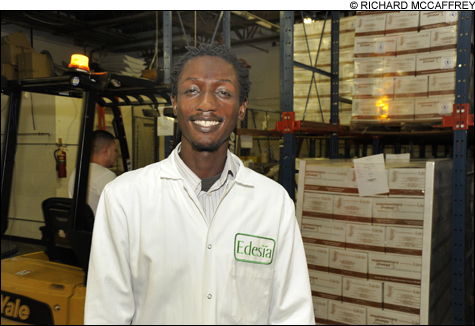
FROM GUINEA TO EDESIA Shipping supervisor Andrew Kamara. |
In the North End of Providence, in a small factory not far from a set of train tracks and a Walmart, a new non-profit is taking up an immodest mission: ending world hunger.
Daunting, yes, but Navyn Salem, the 38-year-old Barrington mother who built the organization from scratch, is a relentless voice for the poor.
"Once you see how fragile the children are, you can never walk away and not do anything about it,'' says Salem. "It wasn't something I could turn my back on."
If all goes as planned, Edesia: Global Nutrition Services will distribute its product — a sticky, sweet-tasting vitamin-packed peanut butter paste hailed as a miracle food — to half a million hungry children by the spring.
It would be a first blow, for the group, against a problem so immense, so stubborn, as to almost be forgotten by many in the West.
The sad fact is that 195 million children suffer from malnutrition, an illness that not only kills, but also turns survivors into weak and stunted adults with such severe health problems they cannot thrive.
Ponder these numbers over your chicken dinner: malnutrition is responsible for a third of all deaths of children 5 and under; lack of food stunts 178 million children; and 24 countries bear 80 percent of the burden of malnutrition, including the top five: Afghanistan, Bangladesh, Pakistan, India, and Nepal.
"It's awful," Salem says. "There are hundreds of thousands of kids who are so close to death, and we know how to fix it."
For Salem, the answer is Plumpy'nut and its similar lines, all gooey pastes that she and her staff — a diverse bunch from 22 countries — make by the ton at a pristine factory in a former office building on Royal Little Drive.
The daughter of a Tanzanian father of Indian descent who moved to this country when he was 22 and an American mother, Salem learned about the devastation of malnutrition during a trip three years ago to her father's homeland, where more than a third of the people are stunted because they don't get enough to eat.
She wanted to do something, but what? She read books about relief doctors and traveled to Rwanda to see poverty for herself and concluded that the biggest killer wasn't AIDS, malaria, or tuberculosis, but malnutrition, which, to her, was tragic because it meant children weren't getting our most basic human need: food.
Edesia was a natural progression. Salem used her own money and a federal grant to jumpstart the factory, which makes the paste on site, grinding the peanuts and squirting the product into foil packets that are boxed and shipped overseas. (Salem's husband, Paul Salem, is a Brown University graduate and senior managing director in Providence Equity Partners, a leading global private equity firm.)
Her first shipment went to Haiti after the earthquake, and a short time later victims of Niger's drought received food. More boxes were air-lifted into flood-ravaged Pakistan just last week. The goal is to distribute Plumpy'nut, as well as Supplementary'Plumpy, Plump'doz, and Nutributter, to 500,000 children by April 1.
CONTROVERSY
You can thank the French for Plumpy'nut.